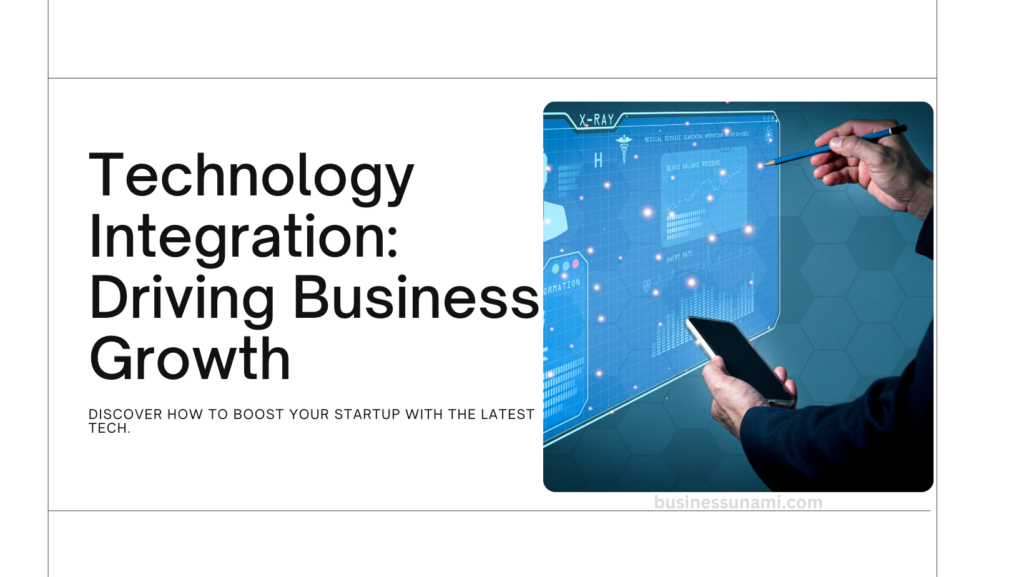
Driving Business Marketing and Startup Growth with Technology Integration
In the dynamic landscape of business and startups, the integration of technology has become synonymous with growth and innovation. In today’s digital age, leveraging tech solutions is not just a choice but a necessity for businesses looking to gain a competitive edge and scale efficiently. From marketing strategies to operational efficiencies, technology plays a pivotal role in shaping the success trajectory of startups and established businesses alike. In this article, we’ll explore how businesses can harness the power of technology to drive marketing initiatives and fuel growth within the tech boundary.
The Intersection of Business, Marketing, and Technology
- Tech-Enabled Marketing Strategies: In the realm of business marketing, technology serves as a catalyst for implementing innovative strategies that resonate with modern consumers. From data-driven insights to personalized experiences, businesses can leverage advanced analytics, AI-driven automation, and machine learning algorithms to optimize their marketing campaigns and enhance customer engagement.
- Digital Transformation Initiatives: For startups and established businesses alike, embracing digital transformation is essential for staying relevant and competitive in today’s market. By adopting cloud computing, IoT devices, and advanced software solutions, businesses can streamline operations, improve efficiency, and unlock new avenues for growth.
- E-Commerce and Online Presence: In an increasingly digital world, having a robust online presence is crucial for businesses to reach and engage with their target audience. Whether through e-commerce platforms, social media channels, or mobile apps, technology enables businesses to showcase their products and services, facilitate seamless transactions, and build meaningful relationships with customers.
- Data Analytics and Insights: Data is often referred to as the new oil, and for a good reason. By harnessing the power of big data analytics, businesses can gain valuable insights into consumer behavior, market trends, and competitive landscapes. This data-driven approach empowers businesses to make informed decisions, tailor their marketing strategies, and drive impactful results.
Leveraging Technology for Business Marketing and Startup Growth
- Targeted Digital Advertising: Utilize digital advertising platforms such as Google Ads, Facebook Ads, and LinkedIn Ads to reach specific demographics, interests, and behaviors. Leverage data analytics to refine targeting parameters and optimize ad performance, ensuring maximum return on investment (ROI) for your marketing budget.
- Content Marketing and SEO: Create compelling content that educates, entertains, and resonates with your target audience. Leverage search engine optimization (SEO) techniques to improve your website’s visibility and organic traffic. Incorporate keywords, optimize meta tags, and publish high-quality content that aligns with your audience’s interests and search intent.
- Social Media Engagement: Engage with your audience on social media platforms such as Facebook, Twitter, Instagram, and LinkedIn. Leverage social listening tools to monitor conversations, gather feedback, and respond to customer inquiries in real-time. Build a community around your brand, share valuable content, and foster meaningful relationships with your followers.
- Email Marketing Automation: Implement email marketing automation tools to deliver personalized, targeted messages to your subscribers. Segment your email list based on demographics, behavior, and engagement metrics to deliver relevant content and promotions. Automate email sequences, welcome series, and abandoned cart reminders to nurture leads and drive conversions.
- CRM and Customer Insights: Implement a customer relationship management (CRM) system to track customer interactions, manage leads, and analyze sales data. Gain valuable insights into customer preferences, purchase history, and lifetime value to tailor your marketing strategies and enhance the customer experience.
- Innovative Product Offerings: Leverage technology to develop innovative product offerings that address emerging market needs and trends. Invest in research and development to stay ahead of the competition, experiment with new technologies such as AI, blockchain, and augmented reality (AR), and continuously iterate based on customer feedback and market dynamics.
Case Studies: Tech-Driven Success Stories
- Airbnb: By leveraging technology to disrupt the hospitality industry, Airbnb has transformed the way people travel and experience accommodations. Through a user-friendly platform, advanced search algorithms, and robust security measures, Airbnb has created a global marketplace connecting travelers with unique lodging options worldwide.
- Uber: Through its innovative use of technology, Uber has revolutionized the transportation industry by offering on-demand ride-hailing services through a mobile app. By seamlessly connecting riders with drivers, optimizing routes, and leveraging data analytics for pricing and demand forecasting, Uber has become a household name synonymous with convenience and accessibility.
Conclusion
In the fast-paced world of business and startups, integrating technology is not just a choice but a strategic imperative for driving growth and staying ahead of the curve. By harnessing the power of technology to fuel marketing initiatives, businesses can reach new heights of success, engage with customers on a deeper level, and unlock new opportunities for innovation and expansion. Whether through targeted digital advertising, content marketing, social media engagement, or innovative product offerings, technology serves as a catalyst for driving business marketing and startup growth within the tech boundary. Embrace the transformative power of technology and unleash your business’s full potential in the digital age.
